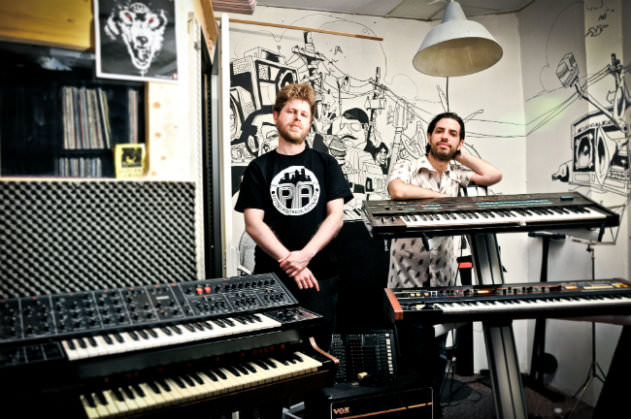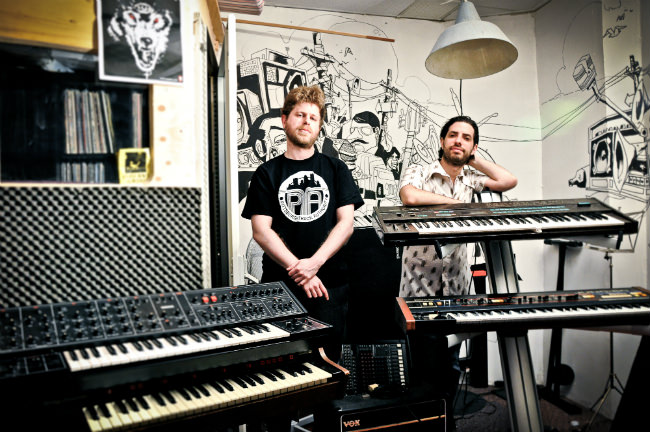We spoke to the Amsterdam-based duo – aka Gal Aner and Jordan Czamanski – about how they approach playing live, their thoughts on the new breed of affordable hardware, and plans for their third album.

Attack: You both come from a jazz background and met through jazz jam sessions. How much does that influence what you do now?
Jordan: Well, just to clarify, I don’t really come from a jazz background. I never took the piano seriously enough for long enough stints. Jazz hit me only in my late teens, and I could never make a living as a jazz musician. I don’t have the skills to pay those jazz bills. But I love jazz probably more than any other kind of music, and very much enjoy playing with other musicians, and as you mentioned, that’s how Gal and I first met. Jazz definitely influences what we do, but more in the attitude than the actual notes we play, even though we do overdo those modal minor 7s sometimes.
We react to each other now in a very similar way to how we used to react to each other when we played jazz standards, but instead of guitar, piano and a heavy swing we now play with drum machines and synths over a heavy 909 thump. And the musical tropes we try to avoid are different.
Jazz definitely influences what we do, but more in the attitude than the actual notes we play.
Gal: I guess my jazz background is somehow always present subconsciously, deep down in things I do musically. But I don’t feel the need to sound ‘jazzy’ really, or over-complicate things. It’s a way of communicating, listening and feeling what’s right for the moment.
Are there times when that kind of background is a hindrance? Do you ever find yourself running the risk of over-thinking the composition process or the theory of what you’re doing?
Jordan: I don’t think we ever think of music theory on stage or in the studio. I wish I knew more theory so I would have more musical knowledge to try to forget while playing.
In addition to Juju & Jordash you’ve also been working quite a lot as Magic Mountain High recently with Move D and Jordan recently released the excellent ‘Crybaby J’ single as a solo project. Do you have a specific aim for each of the projects or are they purely defined by the personnel?
Jordan: There’s no aim for it other than hoping it all falls into place organically. So far so good. We seem to be exploring different things with each release and each gig. Thinking too much about that kind of stuff would fuck things up for sure.
Do you think there are any significant differences between them other than who’s involved? Does working on your own, for instance, Jordan, allow you to explore things you couldn’t do with Gal or David?
Jordan: Due to our methods, it’s all about who’s involved. And that’s the whole world right there. I don’t feel any need to restrain myself in Juju & Jordash or Magic Mountain High – playing with other people just brings out different aspects of each other’s personalities. So far it seems like I’m way less angry in my solo stuff, but way more sad. It’s kinda funny. I hope my shrink is reading this.
I guess I just have a pretty big ego to satisfy and the way to deal with that is in the studio, so the more music I make the better, be it with my bros or all on my lonesome.
It seems like I'm way less angry in my solo stuff, but way more sad. It's kinda funny. I hope my shrink is reading this.
Jordan, you tweeted the other day that you “don’t mind playing a bit cheesier live”. I think it was in reference to the new Roland drum machine, which you mentioned in a few other tweets around the same time. How important is it to consider the audience and adapt in that way? Is it necessary to play slightly cheesier or more accessible stuff than you would in the studio?
Jordan: Naa, it wasn’t about the Roland at all, I was just musing out loud. I give myself a hard time with these kinda things, and like all other angry teens I use the word ‘cheesy’ very loosely. We never really play cheesy stuff – I just like fucking with myself. But, back to your question: there is less intimacy when playing in big clubs than in small venues or at home so naturally the music becomes slightly more immediate and perhaps less intricate and more accessible. It’s definitely not ‘necessary’ to play more straightforward – but it’s more fun in that context. It has a lot to do with acoustics as well – in a big room you have to play less complex stuff or the echo and reverb of the room will kill you.
Is that especially true at the beginning of a set? Do you need to draw people in first before you can take them somewhere else?
Jordan: I guess it is always good to start out with a hug rather than a kick in the nuts. Unless they need a good nut kicking. When we starting gigging regularly a few years ago we had these long-ass ambient and noise intros. We enjoyed them a lot, and they sounded great on loud rigs, but it felt a bit pretentious and dickish to kill the warm-up DJ’s hard work just to make some artsy statement about clubbing and the aesthetic of modern dance music. We aren’t that clever.
It felt a bit pretentious to kill the warm-up DJ’s hard work just to make some artsy statement about clubbing. We aren’t that clever.
How much would you say your improvised set is typically about reading the crowd and responding, and how much is about heading in the direction you personally want to go with the music? Is that a balance you have to be aware of?
Jordan: We just try to be open to the atmosphere and make it as interesting as we can without killing the party. It’s a tightrope act, and in retrospect we seem to try to push the boundaries but not break the rules completely. Those rules change from venue to venue, of course – and that’s up to our judgment, I guess. Am I making sense? Maybe.
